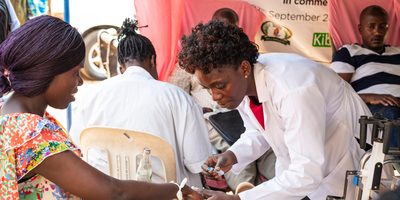
New recommendations to enhance registration processes of drugs for neglected diseases in Africa
Today, at the ‘Council on Health Research for Development’ (COHRED) and ‘The New Partnership for Africa's Development’ (NEPAD) meeting in Pretoria, South Africa, the Drugs for Neglected Diseases initiative (DNDi) and The George Institute for International Health release the report "Registering New Drugs: the African Context". The report issues new recommendations to strengthen regulatory authorisation processes in Africa for drugs against neglected diseases.
The recommendations aim at a closer collaboration between developing and developed countries by involving regulators of endemic countries in all regulatory assessment of new drugs for neglected diseases. The report furthermore recommends that the World Health Organization (WHO) extends its key role in the prequalification process of new tools against Neglected Tropical Diseases (NTDs) in addition to HIV/AIDS, Malaria and Tuberculosis. "WHO is in the best position to join capacities of developed and developing countries to bridge the gap in regulatory matters regarding most neglected diseases", explains Precious Matsoso, Director, Public Health Innovation and Intellectual Property of WHO.
The report also highlights the need to strengthen the regulatory capacity in Africa through the creation of regional centres of excellence in each of Africa’s main sub-regions to upgrade skills and efficiencies of the respective regulatory authorities. The landscape in research and development (R&D) of new treatments for NTDs is changing. New tools are developed and are currently or will be made soon available to populations in need. "DNDi and its partners are committed to deliver new treatments for neglected diseases. We strongly believe that African regulators have a crucial role to assess health tools being used to respond to specific patients needs in their countries", states Dr. Bernard P.coul, Executive Director of DNDi.
There is a gap when it comes to the registration of new drugs in the endemic countries, particularly in Africa. Most regulatory authorities in Africa have experience in registering generic treatments but lack the resources to evaluate the safety, efficacy, and quality of new medicines for diseases that affect millions in their territories. They usually rely on registration by regulatory authorities in developed countries. The regulatory authorities such as the Food and Drug Administration of the United States or the European Medicine Agency, however, do not have sufficient knowledge to make an appropriate risk-benefit assessment for population who are most affected.
"African regulators need to be involved very early in the regulatory assessment of drugs developed for African needs", says Mary Moran from The George Institute for International Health. "This is essential to strengthen African regulatory capacity in the long term and to assume the responsibility of addressing the needs of their population".
The report was commissioned by DNDi to The George Institute for International Health and was reviewed with experts and representatives from regulatory agencies of developed and developing countries as well as from the WHO.
Download the entire report from www.dndi.org


